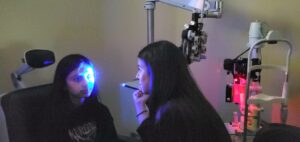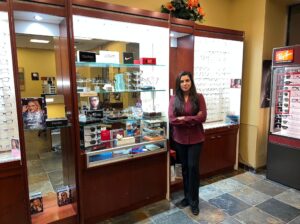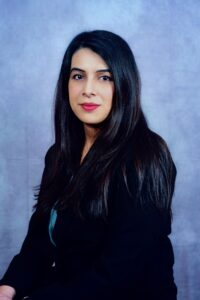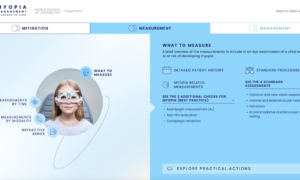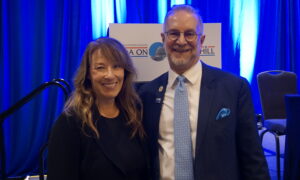February 15, 2024
By Nida Sherwani, OD
I’ve been afforded the opportunity to dedicate myself wholeheartedly to myopia management. With newfound autonomy, I became empowered to engage in extensive parental education initiatives and deliver comprehensive myopia management solutions to my patients.
When I was in optometry school, myopia management wasn’t as front and center as it is now. Indeed, the pandemic and the increased use of digital devices has made it a more pressing concern. While juvenile-onset myopia was covered sporadically in our curriculum, there were few educators specializing in it.
Early in my career, I worked at an ophthalmology practice, and we prescribed low-dose atropine for some of our myopic children. However, the ophthalmologist I worked with never considered additional treatments for myopia.
When I started working in a private optometry practice, one of the optometrists was dabbling in myopia management, but it quickly became an area I wanted to learn more about. I took it upon myself to explore myopia management extensively, dedicating time to study resources such as Review of Myopia Management. As I encountered more myopic children with progressively worsening prescriptions and increasing reliance on glasses, my interest in the field grew. Observing the significant ocular health implications in high myopic adult patients, including retinal complications, early-onset of glaucoma and cataracts, further reinforced the importance of proactive treatments. This realization strengthened my dedication to making myopia management a top priority for safeguarding children’s vision.
When discussing myopia management with parents, sometimes they may not show immediate interest, or they may be hesitant due to cost concerns. In my professional setting, I faced restrictions on autonomy because the practice wasn’t under my direct control. For instance, when I suggested investing in a topographer or biometer for better diagnostics, the practice didn’t see the value in it. Their priority was more on efficient patient flow rather than specialized care.
Igniting My Passion and Fostering Support
Since last year, I’ve taken ownership of a practice in New Jersey from an optometrist who was planning to retire and reduce their workload. This transition has afforded me the opportunity to dedicate myself wholeheartedly to myopia management. With newfound autonomy, I became empowered to engage in extensive parental education initiatives and deliver comprehensive myopia management solutions to my patients.
At my current practice, I’ve also been lucky to have the support of my colleagues. We have three optometrists in our office, and all provide myopia management. Having the support from the other doctors is crucial. This teamwork ensures smooth patient care and gives confidence, knowing everyone is committed to getting the best results for managing myopia.
Educating Parents and Patients
I started talking to most of my adult patients about myopia management. I start by asking if they have children to lead into educational talks. Many adults I’ve encountered are unfamiliar with myopia management treatments, as it wasn’t available during their youth. Hence, by initiating these conversations, I aim to raise awareness and highlight the importance of early intervention.
When parents bring their children to our office, I take a straightforward approach to educating them about myopia without causing undue alarm. I share a packet with brochures and studies I’ve created that outlines the basics of myopia management and the available treatment options: soft multifocal contact lenses, orthokeratology, and low-dose atropine. I explain that if left unchecked, myopia can worsen, leading to increased reliance on glasses. However, I reassure them that we have ways to prevent this progression. My goal is to keep the conversation simple and ensure that both parents and children understand their options clearly.
I send them home with folder that I call their “homework.” From there, we schedule a consultation either in-person or over the phone, and I encourage both parents to be present for this so they can make the decision together. Once they leave my office, I send them an email with a few concise short videos of each treatment plan, to give them more information in a different medium that they can review at home. I also will send them a follow-up text message through our office system letting them know they can reach out with any questions, and I’m always there for them.
Involve the Child
In addition to speaking with parents, I directly involve the child in our discussions about their treatment. I talk to them first, then summarize everything for the parent, and circle back to ensure the child understands. I want them to see me not just as a doctor but also as a friend. Depending on their age and understanding, I explain the treatment options in a way they can grasp. I consider factors like their age, prescription, and maturity level when deciding on the best treatment plan for them.
I recommend a well-rounded approach to my patients’ care. Spending more time outdoors can help prevent myopia, while reducing screen time on devices like smartphones and tablets is also important. Better sleep habits may also play a role in lowering myopia rates, according to recent studies.
Making Myopia Management More Widespread
We need to recognize that juvenile-onset myopia isn’t just a minor eye issue fixable with glasses or contacts. With many proven methods to slow its progression, it’s crucial for us to proactively prescribe these interventions as part of our duty to provide the best care.
Over the past four decades, parents have prioritized various measures to safeguard their children, with the use of car seats and seat belts becoming standard practice in households. Similarly, I envision myopia management emerging as a vital aspect of eye health protection in the years to come. By educating one patient at a time, we can empower families to make informed decisions about their children’s vision care.


